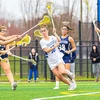
As a senior in high school, Dianne (Carson) Craig could not have envisioned the career she would enjoy. The scores of places she has visited and the many parts of North America she’s called home were the farthest thing from this Hamburg, N.Y., native’s mind. And the role she’s played as a key contributor to the turnaround of one of the world’s most iconic brands was something she couldn’t even fathom.
Today, Ms. Craig is President and CEO of Ford Motor Company Canada, Limited (Ford of Canada). She leads operations across the country, including a national headquarters, three regional offices, two branch offices, three vehicle assembly and engine manufacturing plants, and two parts distribution centers. She oversees 6,000 Ford employees, in addition to partnering with 18,000 others at the more than 400 Ford and Ford-Lincoln dealerships across Canada.
During Homecoming Weekend in September, this member of the Class of 1985 returned to her alma mater for the first time in decades to share her experiences with today’s students, and to reconnect and thank some of those who played a role in helping this Mathematics major become who she is today.
The middle child among five, Dianne didn’t know what she wanted to do after high school, but her parents, Doug and Carol, insisted that the best way to start that path was through college.
“My parents stressed upon all of us that it was absolutely crucial to get a college education,” she recalls. “It wasn’t like it was a choice.”
What was a choice was where she would go. After considering some more expensive or more distant options, she decided that SUNY Fredonia was the best place for her.
“Fredonia had a really good reputation, which it still does today,” she says. “I also liked that it wasn’t too far from my home. At the time I felt like I was hours away, even though it was only 45 minutes. It was the right size for me too.”
That size is something with which most Fredonians readily relate, especially the benefits of small classes and the strong connections often made with the faculty. That was the case for Craig as well, who chose to pursue a Mathematics degree, even though she didn’t plan on becoming a teacher. She was helped along the way by two professors in particular – Drs. Nancy Boynton and H. Joseph Straight.
“I didn’t really know what kind of a degree I wanted to pursue. At first I was thinking more along the lines of engineering, but I loved the math,” she says. “Dr. Straight and Dr. Boynton both had a really big impact on me. At the time, I’m sure they had no idea how strong of an influence they had.”
She’s right. Her mentors admittedly remember her somewhat, but Dianne kept a relatively low profile as a student, and there wasn’t anything about her that really indicated the great success she would go on to achieve.
“We have always said, we can’t tell,” says Boynton about which students will go on to have impressive careers or other standout achievements. “We’ve had some that walk out of here with very high GPAs and never really do anything else. Others appear to be somewhat average, but suddenly hit their strides later in life. That’s why we come to teach every day ready to give our best, because you never really know which ones you’re impacting the most.”
“I remember Dianne as being persistent and self-confident,” adds Straight. “Early on, she took Linear Algebra with me and had a tough time. I was her academic advisor, and at one point we considered changing her major. However, she was determined to be a math major and realized that she just needed to work harder to be successful. That perseverance has no doubt served her well in her career at Ford!”
Craig remembers the department and her classmates as a very close-knit group, never hesitating to help one another with more challenging assignments, thanks to the nurturing, noncompetitive environment which the faculty instilled.
Shortly after graduating, she had the opportunity to interview with Ford, which hired her in an entry-level sales and marketing position in 1986. Perhaps surprisingly, it was her math degree that helped her stand out from the crowd.
“It was a big reason that I got the job at Ford,” she insists. “M.B.A.s were just becoming sort of big, but the math degree was very similar, and it showed that I had strong analytical skills. I’m honestly not sure if a regular business degree would have been good enough [to get hired at Ford], even though I was in marketing, sales and service positions.”
She insists she still uses those same skills today, although she did go on to earn an M.B.A. as well from Ohio State University.“I don’t whip out my linear algebra, necessarily,” she jokes. “But, the strategic thinking, problem-solving, and ability to approach complex situations are skills I use all the time,” she explains, citing some of Ford’s advances in environmentally responsible products and practices as an example.
Craig came to Ford-Canada after serving as the general manager for the Southeast U.S. market since 2009. In this role, she was responsible for all marketing, sales and service operations for 520 Ford and Ford-Lincoln dealers in five states. From 2005 to 2009, she was responsible for Ford and Lincoln Mercury U.S. dealer relations. She has also been a regional sales manager in Pittsburgh in addition to assignments in Detroit, Memphis and Atlanta.
Craig greatly enjoyed her Homecoming visit, especially the chance to see the many physical changes across campus, and the chance to reconnect with her mathematical mentors.
“It’s even more beautiful than I remember,” she says, admitting that the whole experience was a little surreal for her. “And it’s fun to come back in a very different capacity.”
She also enjoyed talking with today’s students and advising them to take advantage of as many opportunities as they can, both in college and afterward.
“I had the chance to basically learn every aspect of the Ford business, so I did,” she explains. “I followed a pretty traditional path, going to various markets across the U.S. I served in multiple departments and learned a little about everything.”
She’s quick to show the appreciation for the opportunities she was given as well.
“I’ve been very lucky to have people – bosses – who put me in the right positions, which allowed me to maximize my development,” she attests. “I can honestly say there isn’t an assignment I’ve had that I didn’t get a tremendous amount out of.”
The last decade has been especially challenging for the auto industry, which underwent a clear paradigm shift. However, Craig views the entire experience as a privilege.
“Our industry has gone through a lot of change. I’ve been able to see the worst of times and the best of times, up close and personal,” she says. “That’s when you see the importance of having a strong vision and a plan, and working with all of your key constituents to make those a reality.”
Among her 26 years at Ford, she insists the best part has been the last six.
“We needed to make some gut-wrenching decisions,” she explains. “We underwent a massive global reorganization, closing down many of our plants. But we continued to invest in our products, and we made sure we could finance the plan ourselves – and not rely on a government bailout.
We did that on our own. We succeeded in getting everyone to work together.
“It’s made me very proud, but it’s also been very humbling. It was hard to lose so many friends [due to the reorganization], but we got through it and came out of it in a much better place.”
The whole experience has been very rewarding for Craig, who now finds herself heading Canada’s automotive market leader in each of the last three years.
Part of that success has come from her willingness to allow herself – and her teammates – to make mistakes, a concept she remembers as being fostered within and outside of the classroom at Fredonia.
“I learn more from my mistakes than the things I do well,” she insists. “I encourage risk taking. When you have that, you’re going to have some mistakes, but I would rather have that than have people who are too complacent or are afraid to challenge conventional thinking.”
She looks at today’s graduates with much admiration, especially in the areas of technology and presentation skills.
“Students today have grown up during a period of accelerated technological advances, so they are much more comfortable in that space,” she observes. “Some are very good presenters too. These strong presentation skills allow them to come into the organization and have a presence and speak with confidence.”
Still, there are areas she’d encourage new graduates to focus upon if they want to distinguish themselves from their millennial counterparts.
“I think the challenge for young people today is in the area of leadership,” she says. “They are so into communicating only via texts and email. Building strong relationships in a business environment is critical to delivering results, which can’t be achieved via email and texting.”
She encourages students to read up on best practices and find strong examples to help shape their leadership skills. She also recognizes that she’s been a part of one of the best case studies in U.S. business history.
“Ford is a classic example,” she agrees. “You can see the mistakes we made, and you can see the turnaround we’ve achieved.”
Craig fully appreciates the great start she received at Fredonia and all that she has achieved to date, but she insists she could never have accomplished any of it without the support of her family and the many great colleagues she’s had over the years. She also credits her decision to make sure she chose a career and a company for which she had a genuine passion. “Whatever you choose, make sure you love your company and what you do,” she advises. “It will make you so much happier, and it’s hard to [succeed] if you don’t.”



